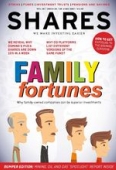Archived article
Please note that tax, investment, pension and ISA rules can change and the information and any views contained in this article may now be inaccurate.
What’s going on with housebuilder Berkeley?

The chairman of London high end housebuilder Berkeley (BKG) has an enviable record of calling the housing market.
Tony Pidgeley, who founded the company in 1975, led Berkeley in selling land in the late 1980s before the big crash in the early 1990s. He then took advantage of bombed out valuations to build up Berkeley’s land bank in the aftermath.
Results announced on 21 June for the 12 months to 31 April show the company is continuing to add to its land bank, up year-on-year from 42,858 plots to 46,351.
That investment is despite Berkeley committing itself to generous annual cash returns of 200p per share over the next four years.
Reasons to be cautious
You need good reasons to go against Pidgeley’s instincts and Shares has several.
First, Pidgeley has been selling shares in the company. Back in April he sold 1m shares at £31.30, 5% below the current share price.
Second, to quote investment bank Morgan Stanley, ‘a boom in London house prices and volumes has benefited the company in recent years, which we think is in the process of (at least partial) unwinding.’
Although the devaluation of sterling may have made valuations more attractive, the ongoing Brexit process is, on balance, unlikely to be supportive to foreign investment in the prime London properties built by Berkeley.
There was a 30% year-on-year dip in the number of new homes it had begun building in London in the six months to 30 April 2017.
Build costs increased by 6% in Berkeley’s most recent financial year. Chief executive Rob Perrins says: ‘There is a recognised skills gap in the UK construction workforce and it is hard to predict how build costs will be affected by Brexit as approximately half of London’s site labour comes from the EU.’
Nonetheless, citing its healthy balance sheet, bumper forward sales and strong market dynamics, Berkeley reiterated its guidance for pre-tax profit of £3bn over the five years to 2021.
Are the shares cheap?
On that basis, an April 2018 price-to-earnings (PE) of 7.4 times and prospective yield of 6% could look enticing. Arguably price to net asset value (NAV) is a better way to value a housebuilder than a PE ratio. Here, Berkeley is actually trading a touch above its long-term average at 1.8 times forecast NAV.
Berkeley should be able to deliver the promised payouts to shareholders over the next four years so it could interest income investors but in our view the longer-term picture is less certain.
Important information:
These articles are provided by Shares magazine which is published by AJ Bell Media, a part of AJ Bell. Shares is not written by AJ Bell.
Shares is provided for your general information and use and is not a personal recommendation to invest. It is not intended to be relied upon by you in making or not making any investment decisions. The investments referred to in these articles will not be suitable for all investors. If in doubt please seek appropriate independent financial advice.
Investors acting on the information in these articles do so at their own risk and AJ Bell Media and its staff do not accept liability for losses suffered by investors as a result of their investment decisions.
Issue contents
Big News
Editor's View
Great Ideas Update
Investment Trusts
Larger Companies
Main Feature
Money Matters
Smaller Companies
Story In Numbers
- Petropavlovsk co-founder kicked off the board after 23 years’ service
- Which FTSE 350 Shares have Lost Shareholders Money
- Which FTSE 350 Shares Rewarded Shareholders
- $390bn wiped off global drug sales forecasts
- 98.6% vote in favour of Standard Life/Aberdeen merger
- London’s shrinking bank industry
- 150M Hurricane blows Crystal Amber down

 magazine
magazine









